formerly eScholarship Editions


|
|
|
|
Your search for
'Classics' in subject
and
Public
in rights
found 42 book(s). | Modify Search | Displaying 21 - 40 of 42 book(s) | |
| 21. | 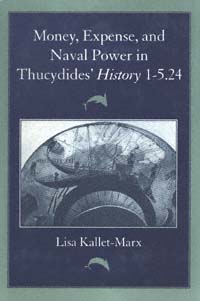 | Title: Money, expense, and naval power in Thucydides' History 1-5.24 Author: Kallet-Marx, Lisa Published: University of California Press, 1993 Subjects: Classics | Economics and Business | Ancient History Publisher's Description: Thucydides has been found guilty of indifference toward financial matters without a consideration of all the evidence. Now Lisa Kallet-Marx examines Thucydides' treatment of financial resources by studying his comments on finance in the context of the whole work and scrutinizes other, chiefly epigraphic, evidence as well. Her comprehensive inspection of the Archaeology, Pentekontaetia, and history of the Archidamian War demonstrates that the role of financial resources is central to Thucydides' ideas about naval power and figures prominently in his speeches and narrative.Kallet-Marx's research reveals an important stage in the historical development of thought about state power, wealth, and imperialism. Her book will greatly interest scholars of ancient economics and classicists alike. [brief] Similar Items |
| 22. | 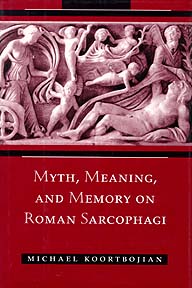 | Title: Myth, meaning, and memory on Roman sarcophagi Author: Koortbojian, Michael Published: University of California Press, 1995 Subjects: Classics | Art | Art History | Art and Architecture Publisher's Description: Michael Koortbojian brings a novel approach to his study of the role of Greek mythology in Roman funerary art. He looks at two myths - Aphrodite and Adonis and Selene and Endymion - not only with respect to their appearance on Roman sarcophagi, but also with regard to the myths' significance in the greater fabric of Roman life. Moving beyond the examination of these sarcophagi as artistic achievements, he sets them in their broader historical and social contexts.Remembrance was an important factor in ancient social life and fueled the need for memorials. In helping us to understand the powerful allusions that Greek myths presented for the Romans, and the role of those allusions in preserving the memory of the dead, Koortbojian effectively widens our vision of the ancient world. [brief] Similar Items |
| 23. | 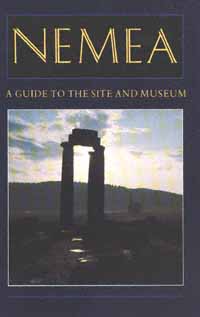 | Title: Nemea: a guide to the site and museum Author: Miller, Stephen G. (Stephen Gaylord) 1942- Published: University of California Press, 1989 Subjects: Classics | History | Archaeology | Ancient History Publisher's Description: In classical antiquity, beginning in 573 B.C., Nemea hosted international athletic competitions like those at Olympia, Delphi, and Isthmia; the games at the four sites constituted the Panhellenic cycle, and the victors were the most famous athletes of antiquity. Nemea was never a city-state but served as a religious and athletic festival center where the Greek world assembled every two years under a flag of truce.Since 1974, excavations sponsored by the University of California at Berkeley have revealed many details of Nemea's history, as well as evidence for the nature of the buildings and other facilities which were part of the festival center. These discoveries, together with smaller finds in the museum and ancient literary and epigraphic sources, form the basis of a new and sharply defined picture of the Nemean Games.This guidebook is an introduction to the history and physical remains of the festival center and a complement to detailed final publications on the excavation now being prepared. [brief] Similar Items |
| 24. | 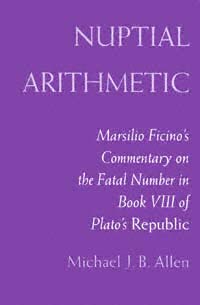 | Title: Nuptial arithmetic: Marsilio Ficino's commentary on the fatal number in Book VIII of Plato's Republic Author: Allen, Michael J. B Published: University of California Press, 1994 Subjects: Classics | Philosophy | Medieval Studies | Renaissance History Publisher's Description: The latest of Michael Allen's distinguished studies of the Renaissance Neoplatonist, Marsilio Ficino (1433-1499), presents a difficult, fascinating text. Late in his career, Ficino wrote a commentary on the intractable passage in Book VIII of Plato's Republic that concerns the mysterious geometric or "fatal" number. He was thus the first modern interpreter of this famous passage, and Allen is the first in our era to translate and elucidate his remarkable commentary.Allen's critical translation of Ficino's analysis of the fatal number passage shows how it develops philosophical, psychological, numerological, astrological, and prophetic themes that had a particular resonance at the end of the fifteenth century. [brief] Similar Items |
| 25. | 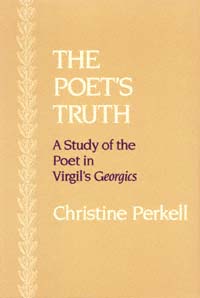 | Title: The poet's truth: a study of the poet in Virgil's Georgics Author: Perkell, Christine Published: University of California Press, 1989 Subjects: Classics | Classical Literature and Language Publisher's Description: The controversy over Virgil's optimism or pessimism, which has long absorbed readers of his poetry, might fruitfully yield to a perspective which allows contradictions to stand unresolved, to constitute, in fact, the essence of his poems' meaning. So interpreted, the pervasive contradictions of the Georgics are not problems to be solved, but expressions of the poet's vision of fundamental tensions in human experience.Focusing on the figure of the poet in his relationship to the farmer, Professor Perkell studies oppositions between power and beauty, profit and art, matter and spirit, which are critical to the poem's meaning. She points to the poet's privileging of myth over praeceptum , of divine revelation over experiment and practice, and of mystery over solution. The poem's oppositions find ultimate expression in the bougonia , literally false as Georgic precept but metaphorically true as image of Iron Age technology and culture. Through this metaphor, the poet suggests the high value of his own truth and implicitly challenges the values of the agricultural, material poem which the Georgics on its surface professes to be.Shaped by insights of reader-response and structuralist criticism, this new study of the Georgics should interest Classicists and students of literature. [brief] Similar Items |
| 26. | 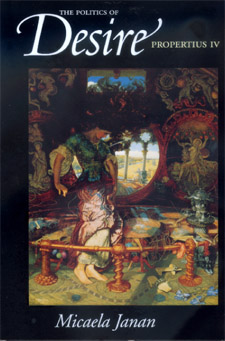 | Title: The politics of desire: Propertius IV Author: Janan, Micaela Wakil Published: University of California Press, 2000 Subjects: Classics | Classical Literature and Language | Poetry Publisher's Description: Propertius (ca. 54 b.c.--ca. 2 b.c.) was a Roman poet who composed four compelling books of elegies in the chaotic years surrounding Rome's transition from republic to empire. The first three of these books revolve mostly around a tormented love affair with a woman called Cynthia. The fourth book of poetry rests on more diverse subject matter and is notoriously the most opaque and elusive. In The Politics of Desire, Micaela Janan radically reassesses Propertius' last elegies, using contemporary psychoanalytic theory to illuminate these challenging texts. Janan finds that the upheaval of Rome's transformation to empire corresponds to the intellectually unsettled conditions of our own time, so that contemporary methodologies offer an uncannily suitable approach for understanding Propertius. In particular, she uses the work of Jacques Lacan, since it provides the best conceptual tools for examining the relation between political crisis and the struggles of the self, a theme that resonates in these difficult elegies. This book expands our understanding of an important Roman poet, and its innovative and sophisticated methodological approach makes a substantial contribution to feminist and psychoanalytic criticism. In addition, Janan addresses elegy's relationship to larger cultural questions, and broadens our understanding of the social crisis affecting Rome during the early empire. [brief] Similar Items |
| 27. | 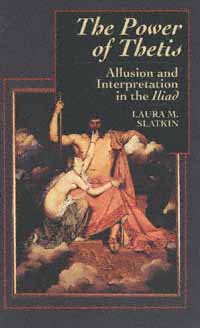 | Title: The power of Thetis: allusion and interpretation in the Iliad Author: Slatkin, Laura M Published: University of California Press, 1992 Subjects: Classics | Classical Literature and Language | Classics Publisher's Description: In The Power of Thetis, Laura M. Slatkin reveals the full importance of mythic allusion in Homeric composition and in the experience of Homer's audience. Similar Items |
| 28. | 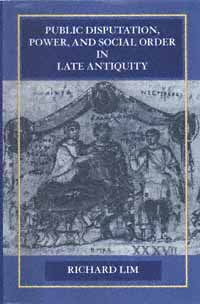 | Title: Public disputation, power, and social order in late antiquity Author: Lim, Richard 1963- Published: University of California Press, 1995 Subjects: Classics | Classical Religions | Religion | Christianity Publisher's Description: Richard Lim explores the importance of verbal disputation in Late Antiquity, offering a rich socio-historical and cultural examination of the philosophical and theological controversies. He shows how public disputation changed with the advent of Christianity from a means of discovering truth and self-identification to a form of social competition and "winning over" an opponent. He demonstrates how the reception and practice of public debate, like other forms of competition in Late Antiquity, were closely tied to underlying notions of authority, community and social order. [brief] Similar Items |
| 29. | 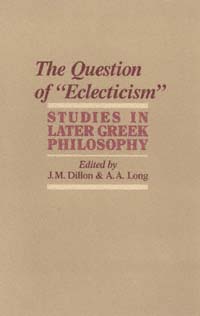 | Title: The Question of "eclecticism": studies in later Greek philosophy Author: Dillon, John M Published: University of California Press, 1988 Subjects: Classics | Classical Philosophy | Social and Political Thought Publisher's Description: This collection of essays is addressed to the growing number of philosophers, classicists, and intellectual historians who are interested in the development of Greek thought after Aristotle. In nine original studies, the authors explore the meaning and history of "eclecticism" in the context of ancient philosophy. The book casts fresh light on the methodology of such central figures as Cicero, Philo, Plutarch, Sextus Empiricus, and Ptolemy, and also illuminates many of the conceptual issues discussed most creatively in this period. [brief] Similar Items |
| 30. | 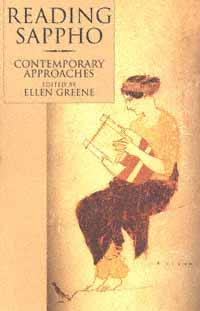 | Title: Reading Sappho: contemporary approaches Author: Greene, Ellen 1950- Published: University of California Press, 1998 Subjects: Classics | Classical Literature and Language | Literary Theory and Criticism | Poetry Publisher's Description: Reading Sappho considers Sappho's poetry as a powerful, influential voice in the Western cultural tradition. Essays are divided into four sections: "Language and Literary Context," "Homer and Oral Tradition", "Ritual and Social Context", and "Women's Erotics". Contributors focus on literary history, mythic traditions, cultural studies, performance studies, recent work in feminist theory, and more.A legendary literary figure, Sappho has attracted readers, critics, and biographers ever since she composed poems on the island of Lesbos at the close of the seventh century B.C. Bringing together some of the best recent criticism on the subject, this volume, together with Re-Reading Sappho , represents the first anthology of Sappho scholarship, drawing attention to Sappho's importance as a poet and reflecting the diversity of critical approaches in classical and literary scholarship during the last several decades. [brief] Similar Items |
| 31. | 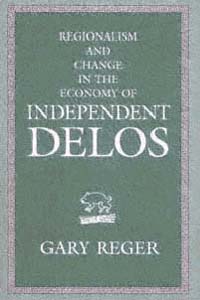 | Title: Regionalism and change in the economy of independent Delos, 314-167 B.C Author: Reger, Gary Published: University of California Press, 1994 Subjects: Classics | History | Archaeology | Economics and Business | Ancient History Publisher's Description: Gary Reger's highly original book applies modern statistical analysis to the detailed inscriptions at the Temple of Apollo on Delos. These inscriptions, discovered during excavations in the late nineteenth and early twentieth centuries, provide a wealth of information about the business and economic enterprises of the island from 314 to167 B.C.Reger examines the abundant data from the inscriptions and seeks patterns in the production and use of commodities (olive oil, pigs, firewood, barley, wheat) and in fluctuations in rents for real estate. Linking the island's economic history to the larger political scene, he offers a trenchant and overdue argument for an analysis of the Delian economy as a regional phenomenon, not - as others have seen it - as a center of international exchange. [brief] Similar Items |
| 32. | 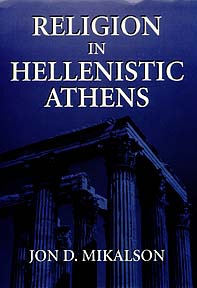 | Title: Religion in Hellenistic Athens Author: Mikalson, Jon D 1943- Published: University of California Press, 1998 Subjects: Classics | Classical Religions | Religion | Ancient History Publisher's Description: Until now, there has been no comprehensive study of religion in Athens from the end of the classical period to the time of Rome's domination of the city. Jon D. Mikalson provides a chronological approach to religion in Hellenistic Athens, disproving the widely held belief that Hellenistic religion during this period represented a decline from the classical era. Drawing from epigraphical, historical, literary, and archaeological sources, Mikalson traces the religious cults and beliefs of Athenians from the battle of Chaeroneia in 338 B.C. to the devastation of Athens by Sulla in 86 B.C., demonstrating that traditional religion played a central and vital role in Athenian private, social, and political life. Mikalson describes the private and public religious practices of Athenians during this period, emphasizing the role these practices played in the life of the citizens and providing a careful scruntiny of individual cults. He concludes his study by using his findings from Athens to call into question several commonly held assumptions about the general development of religion in Hellenistic Greece. [brief] Similar Items |
| 33. | 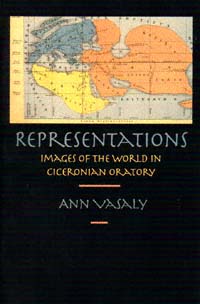 | Title: Representations: images of the world in Ciceronian oratory Author: Vasaly, Ann Published: University of California Press, 1993 Subjects: Classics | Literature | Politics | History | Literary Theory and Criticism | Classical Literature and Language Publisher's Description: Ann Vasaly introduces representation theory into the study of Ciceronian persuasion and contends that an understanding of milieu - social, political, topographical - is crucial to understanding Ciceronian oratory. As a genre uniquely dependent on an immediate interaction between author and audience, ancient oratory becomes performance art.Vasaly investigates the way Cicero represented the contemporary physical world - places, topography, and monuments, both those seen and those merely mentioned - to his listeners and demonstrates how he used these representations to persuade. Her exceptionally well-written study deftly recaptures the immediacy of Cicero's oratory and makes a trenchant contribution to an important new area of inquiry in Classical Studies. [brief] Similar Items |
| 34. | 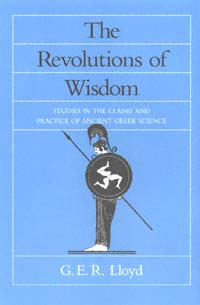 | Title: The revolutions of wisdom: studies in the claims and practice of ancient Greek science Author: Lloyd, G. E. R. (Geoffrey Ernest Richard) 1933- Published: University of California Press, 1989 Subjects: Classics | Classical History Publisher's Description: G.E.R. Lloyd's wide-ranging and historical study of the development of Greek science is a valuable contribution to current debates in the philosophy of language, on the analysis of scientific revolutions, and the rationality of science. Similar Items |
| 35. | 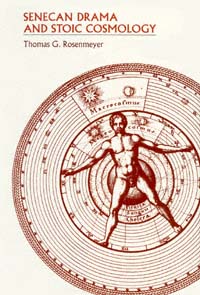 | Title: Senecan drama and stoic cosmology Author: Rosenmeyer, Thomas G Published: University of California Press, 1989 Subjects: Classics | Classical Literature and Language | Classical Philosophy | Theatre Publisher's Description: Lucius Annaeus Seneca, Nero's tutor and advisor, wrote philosophical essays, some of them in the form of letters, and dramas on Greek mythological topics, which since the early Renaissance have exercised a powerful influence on the European theater. Because in his essays Seneca, in his own eclectic way, subscribes to the philosophy of the Stoic school, scholars and critics have long been asking the question whether the plays, also, could be regarded as transmitters of Stoic thought. Various answers, ranging from a categorical no to an uneasy yes, have been given.With few exceptions, the students who have concerned themselves with this question have looked for their enlightenment in Stoic psychology and Stoic ethics. In this book, Thomas G. Rosenmeyer proposes instead to look at the Stoic science of nature, of the world and human beings in the world, as a more plausible grounding for the difference between Senecan drama and its Greek predecessors. In the process of looking at what the Stoics, especially the early Stoics, had to say about the forces determining natural phenomena, the author uncovers a deeply pessimistic strain in Stoic cosmology, and an interest in physicality and environmental tension, that he finds replicated in the theater, not only of Seneca, but also of the later European tradition indebted to him. [brief] Similar Items |
| 36. | 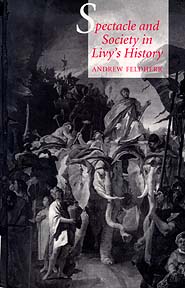 | Title: Spectacle and society in Livy's history Author: Feldherr, Andrew 1963- Published: University of California Press, 1998 Subjects: Classics | Classical Literature and Language | Classical History | Comparative Literature | Literature Publisher's Description: Public spectacle - from the morning rituals of the Roman noble to triumphs and the shows of the Arena - formed a crucial component of the language of power in ancient Rome. The historian Livy (c. 60 B.C.E.-17 C.E.), who provides our fullest description of Rome's early history, presents his account of the growth of the Roman state itself as something to be seen - a visual monument and public spectacle. Through analysis of several episodes in Livy's History , Andrew Feldherr demonstrates the ways in which Livy uses specific visual imagery to make the reader not only an observer of certain key events in Roman history but also a participant in those events. This innovative study incorporates recent literary and cultural theory with detailed historical analysis to put an ancient text into dialogue with contemporary discussions of visual culture.In Spectacle and Society in Livy's History , Feldherr shows how Livy uses the literary representation of spectacles from the Roman past to construct a new sense of civic identity among his readers. He offers a new way of understanding how Livy's technique addressed the political and cultural needs of Roman citizens in Livy's day. In addition to renewing our understanding of Livy through modern scholarship, Feldherr provides a new assessment of the historian's aims and methods by asking what it means for the historian to make readers spectators of history. [brief] Similar Items |
| 37. | 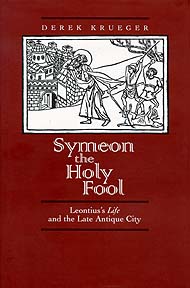 | Title: Symeon the holy fool: Leontius's Life and the late antique city Author: Krueger, Derek Published: University of California Press, 1996 Subjects: Religion | Literature | Christianity | Classics | Classical Religions Publisher's Description: This first English translation of Leontius of Neapolis's Life of Symeon the Fool brings to life one of the most colorful of early Christian saints. In this study of a major hagiographer at work, Krueger fleshes out a broad picture of the religious, intellectual, and social environment in which the Life was created and opens a window onto the Christian religious imagination at the end of Late Antiquity. He explores the concept of holy folly by relating Symeon's life to the gospels, to earlier hagiography, and to anecdotes about Diogenes the Cynic.The Life is one of the strangest works of the Late Antique hagiography. Symeon seemed a bizarre choice for sanctification, since it was through very peculiar antics that he converted heretics and reformed sinners. Symeon acted like a fool, walked about naked, ate enormous quantities of beans, and defecated in the streets. When he arrived in Emesa, Symeon tied a dead dog he found on a dunghill to his belt and entered the city gate, dragging the dog behind him. Krueger presents a provocative interpretation of how these bizarre antics came to be instructive examples to everyday Christians. [brief] Similar Items |
| 38. | 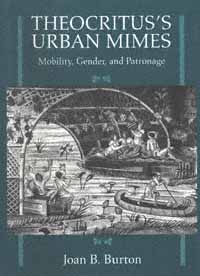 | Title: Theocritus's urban mimes: mobility, gender, and patronage Author: Burton, Joan B 1951- Published: University of California Press, 1995 Subjects: Classics | Classical Literature and Language | Women's Studies Publisher's Description: Drawing on current literary, cultural, and historical approaches, Joan Burton presents sophisticated new readings of Theocritus's urban mimes, which are among the most frequently cited evidence of Hellenistic cultural life, religion, magic, and aesthetics. Unlike Theocritus's bucolic poems, which focus on the male experience, all of his urban mimes represent women in more central and powerful roles, reflecting the growing visibility of Greek women at the time. A work of both innovation and wide-ranging scholarship, this book will be welcomed not only by students of the Hellenistic age but also by readers interested in issues of gender, sexuality, and culture in the ancient world. [brief] Similar Items |
| 39. | 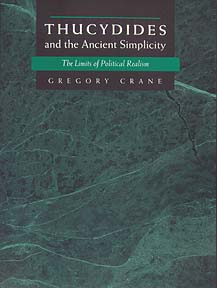 | Title: Thucydides and the ancient simplicity: the limits of political realism Author: Crane, Gregory 1957- Published: University of California Press, 1998 Subjects: Classics | Politics | Political Theory | History | Intellectual History Publisher's Description: Thucydides' History of the Peloponnesian War is the earliest surviving realist text in the European tradition. As an account of the Peloponnesian War, it is famous both as an analysis of power politics and as a classic of political realism. From the opening speeches, Thucydides' Athenians emerge as a new and frightening source of power, motivated by self-interest and oblivious to the rules and shared values under which the Greeks had operated for centuries. Gregory Crane demonstrates how Thucydides' history brilliantly analyzes both the power and the dramatic weaknesses of realist thought. The tragedy of Thucydides' history emerges from the ultimate failure of the Athenian project. The new morality of the imperialists proved as conflicted as the old; history shows that their values were unstable and self-destructive. Thucydides' history ends with the recounting of an intellectual stalemate that, a century later, motivated Plato's greatest work. Thucydides and the Ancient Simplicity includes a thought-provoking discussion questioning currently held ideas of political realism and its limits. Crane's sophisticated claim for the continuing usefulness of the political examples of the classical past will appeal to anyone interested in the conflict between the exercise of political power and the preservation of human freedom and dignity. [brief] Similar Items |
| 40. | 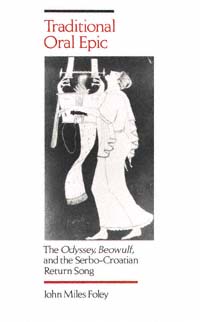 | Title: Traditional oral epic: the Odyssey, Beowulf, and the Serbo-Croatian return song Author: Foley, John Miles Published: University of California Press, 1991 Subjects: Literature | Literary Theory and Criticism | European Literature | Folklore and Mythology | Religion | Language and Linguistics | Classics | Medieval Studies Publisher's Description: John Miles Foley offers an innovative and straightforward approach to the structural analysis of oral and oral-derived traditional texts. Professor Foley argues that to give the vast and complex body of oral "literature" its due, we must first come to terms with the endemic heterogeneity of traditional oral epics, with their individual histories, genres, and documents, as well as both the synchronic and diachronic aspects of their poetics.Until now, the emphasis in studies of oral traditional works has been placed on addressing the correspondences among traditions - shared structures of "formula," "theme," and "story-pattern." Traditional Oral Epic explores the incongruencies among traditions and focuses on the qualities specific to certain oral and oral-derived works. It is certain to inspire further research in this field. [brief] Similar Items |